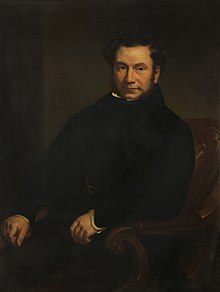Benjamin Hick
| Benjamin Hick | |
|---|---|

c.1840 by George Patten ARA (1801–1865)
|
|
| Born | 1 August 1790 Huddersfield |
| Died |
9 September 1842 (aged 52) Bolton |
| Nationality | British |
| Occupation | Civil and Mechanical engineer Architectural designer Company director |
| Known for | Steam engines Locomotives Architecture Art Collector |
| Notable work | 3-cylinder locomotive Aerodynamic disc wheel Hydraulic press Radial Drilling machine 2-cylinder beam engine |
Benjamin Hick (1 August 1790 – 9 September 1842) was a successful English civil and mechanical engineer, art collector and patron; his improvements to the steam engine and invention of scientific tools were held in high esteem by the engineering profession, some of Hick's improvements became public property without claiming the patent rights he was entitled to.
He was born at Huddersfield, and christened in the Independent chapel at Highfield, his parents moving shortly afterwards to Leeds where he was educated.
Hick's aptitude for mechanics and passion for drawing led to an apprentiship in 1804 (age 14) as a draughtsman with Fenton, Murray and Wood at the Round Foundry in Holbeck. The company made steam engines, textile and other machinery; here he was entrusted with the installation of several large steam engines and offered a partnership when his apprenticeship expired. The offer was declined and Hick moved instead to Bolton in 1810 to work for Smalley, Thwaites and Company as manager of Rothwell's Union Foundry on Blackhorse Street. His brother John also trained as an engineer and worked at the Bowling Iron Works near Bradford.
In July 1820 Hick joined other leading industrialists Isaac Dobson, Thomas Hardcastle and Peter Rothwell together with engineer Joshua Routledge to form the Bolton Gaslight and Coke Company, providing gas for public buildings, street lamps and industrial lighting. With the inevitable fire risk of naked flame, the Great Bolton Trustees and a number of mill owners bought horse-drawn fire engines; Hick became a Trustee of Great Bolton during the early 1820s, he was an Anglican and prominent member of Bolton's Pitt Club, formed 1809 as a "political organisation composed of the admirers of William Pitt", that helped Hick move amongst the middle class social elite of the time.
...
Wikipedia
